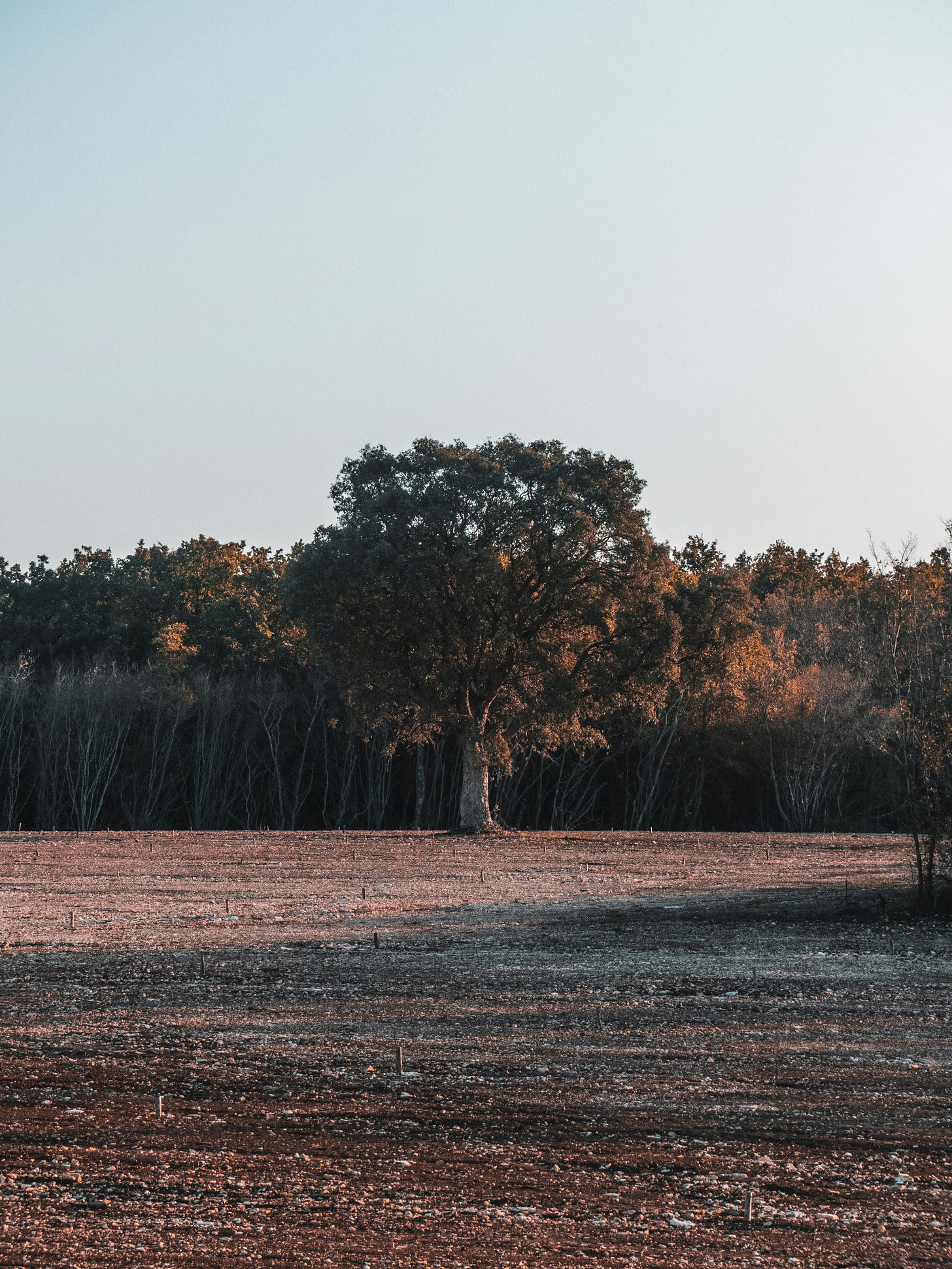Happy (soon-to-be) March, everyone! Spring is around the corner, and the dormancy of winter will soon fade.
When I was thinking about what to write this month, the only thing that came to mind was to write the truth. And, the truth is, I haven’t had many (ok, any) creative ideas lately. It’s like the neurons in my brain that spark creative thought stopped firing. That’s different for me. I’ve had seasons with plenty of ideas but no energy or margin. Or seasons when I was tired and needed rest and replenishment. Or seasons when I was transitioning from one project to another. But I can’t remember ever being in a season where all the ideas seemed to have dried up—especially when I had plenty of margin. And it’s been unsettling. In the void of creative thought, other thoughts resound. Who am I if I am not creative? Who am I if I am not writing and thinking and communicating? Who am I if I’m not productive? Who am I if…?
Those questions alone are revealing. They indicate my desire to be tethered to something substantive and do something meaningful with the life I’ve been given, which is good. But they also reveal that somewhere along the way, I bought into the lie that my productivity and fruitfulness are synonymous with value and faithfulness. They remind me how easy it is to confuse what you do with who you are.
This conflation of work and worth isn’t new to me; it’s been a recurring theme in my spiritual journey. Yet, this creative drought exposes another inclination: to view dormancy with suspicion, even interpreting it as divine judgment—the belief that somehow, somewhere, I disappointed God yet again, and, as a result, he has silenced me. Is that possible? Without a doubt, yes! But isn’t it also possible that God might be orchestrating something different? Without a doubt, yes!
All of this has me thinking. Why are we so quick to jump to negative assumptions about God and ourselves when life isn’t going as expected? Why do we label seasons as good or bad based solely on our perceptions and experiences? Why do we rush to pronounce judgment instead of having an open and curious posture toward life’s ebbs and flows?
Throughout the Bible, we see men and women of faith experiencing seasons of apparent dormancy. God promised Abraham and Sarah a son, but they remained infertile for 25 more years before Isaac was born. It would be easy for Abraham and Sarah to question and wrestle in those years. Where was God? Why the delay? Why the apparent inaction on God’s part?
Or Israel, whom God promised to turn into a great nation, and yet they endured generations of slavery under Egyptian tyranny. Or the 400 years of silence that followed God’s promises to send a redeemer. Again, perceiving these seasons as fruitless and void of divine activity would be easy.
But in each case, God was quietly working behind the scenes, orchestrating events in his timing. With this in mind, we can resist the urge to view seasons of dormancy as unfruitful and instead welcome them as full of potential—a time for our roots to grow deeper, our faith to mature, and for God to equip us for what lies ahead.
So, this month, I want to reflect on seasons of dormancy and the fruitful life in Christ.
Three truths about seasons of dormancy
Seasons of dormancy are inevitable: The writer of Ecclesiastes reminds us of the seasonal nature of life—that there is, in fact, a time for everything.
A time to be born and a time to die.
A time to plant and a time to harvest.
A time to kill and a time to heal.
A time to tear down and a time to build up.
A time to cry and a time to laugh.
A time to grieve and a time to dance.
A time to scatter stones and a time to gather stones.
A time to embrace and a time to turn away.
A time to search and a time to quit searching.
A time to keep and a time to throw away.
A time to tear and a time to mend.
A time to be quiet and a time to speak.
A time to love and a time to hate.
A time for war and a time for peace.
Ecclesiastes 3:1-8, ESV
To this, we might also add: a time for fruitfulness and a time for dormancy. The writer goes on to say that God makes everything—even dormancy—beautiful in its time (v. 11).
Just like it took Abraham and Sarah and the Israelites to see the unveiling of God’s plan over time, we will not always understand the season we are in. Dormancy could be a time of replenishment. It could be redirection. It could be a time for slowing down and reflection. It could also be a season of preparation. Rather than pronouncing a moral judgment on these seasons, what would it look like to have a posture of openhanded curiosity toward them? When we understand that seasons of dormancy are inevitable, we can start asking different questions.
Do you want to know the difference between questions of suspicion and questions of openhanded curiosity? Here is a list to get us started:
Questions of Suspicion:
Why is God doing this to me?
What is wrong with me?
What did I do wrong?
Why does this keep happening to me?
Why did God allow this?
Why hasn’t God done anything to resolve this?
Questions of Openness and Curiosity:
I wonder what God is up to?
What does God have for me in this season?
Where do I see glimpses of God in this season?
Where is God revealing more of himself to me in this season?
What truth might God want me to learn?
What might God be trying to free me from?
What questions come to mind for you? What would you add?
Seasons of dormancy are productive: We may, at times, feel unproductive, but that doesn't necessarily indicate spiritual death or even stagnancy. The dictionary defines dormancy in relation to biology as “a state of minimal metabolic activity with cessation of growth, either as a reaction to adverse conditions or as part of an organism's normal annual rhythm.”
When I think about spiritual dormancy in light of that definition, a few things come more clearly into focus:
Dormancy is cessation of growth or a period of inactivity. Dormant does not mean dead. Just like a plant can appear devoid of life yet maintain a robust, healthy root system, so can we.
Dormancy can be part of life’s normal rhythm. Just as the writer of Ecclesiastes said, there is a cyclical rhythm to life. It’s part of the natural order of things. Day gives way to night; night gives way to day. Summer gives way to fall, fall to winter, winter to spring, and spring again to summer. Perhaps, then, periods of dormancy are intrinsic to our spiritual journey.
Additionally, dormancy can be a reaction to adverse conditions. One of my favorite plants—the fiddle leaf fig—is also one of the most sensitive to change. Whenever I moved it from one house to another or one location to another, it often shed leaves. The stress it experienced from the move temporarily affected it in adverse ways. But that didn’t mean it was dead. On the contrary, the plant would eventually thrive again with the right time, care, and attention. Similarly, when we experience adverse conditions, we need time, care, and attention to recover and flourish.
Reflecting on this sheds helpful light on my current season of dormancy. Having uprooted my entire life a little over two months ago, it makes sense that my body, mind, and soul are reacting to the stress of significant change. So, rather than fearing this period of dormancy and viewing it as fruitless, I can embrace it and allow the cycle to run its natural course, knowing that over time, I will once again reap a harvest of spiritual fruit.
Seasons of dormancy are necessary: I am currently reading through the Old Testament again, and I am reminded of God’s call to the Sabbath. I’ve often understood Sabbath as more of a command and missed that it is also an invitation. Through the Sabbath, God invites us to recognize our limitations and vulnerabilities. It's a time to cease productivity, to pause our activities, and simply be. To embrace unproductivity. To be replenished. To be reminded of God's faithful provision. Ultimately, Sabbath reminds me of my mortality—that I am dust and to dust, I will return, which frees me of any delusion of self-importance. Nothing depends on me. Nothing.
Two misconceptions about dormancy and fruitfulness:
Misconception #1: Seasons of dormancy mean God is angry or displeased with us.
Misconception #2: Seasons of fruitfulness mean God is pleased with us.
We seem to have adopted an unbiblical perspective regarding how God operates in our lives. We mistakenly equate fruit and productivity with God’s favor while associating trials, hardships, or dormancy with his displeasure.
This realization struck me while listening to the podcast "The Rise and Fall of Mars Hill," which delved into the dysfunction within Mars Hill Church in Seattle. Interviewees grappled with witnessing profound brokenness in the leadership while at the same time seeing remarkable growth and transformation among the congregation.
One guest illustrated this paradox using the example of cancer, which often grows rapidly. His point: growth isn't always a sign of health. Similarly, productivity and abundance don't necessarily indicate God's blessing. Sometimes, it's God working despite our sins and failures. Likewise, periods of dormancy don't necessarily reflect God's judgment or displeasure with us.
Nothing has helped me uncover these misconceptions more than the book of Job and the psalms of lament. Job, whom God described as blameless and upright (Job 1:8, 2:3), encountered catastrophic loss and endured chronic, debilitating suffering. For countless chapters, we listen in as Job’s friends mistakenly assume and postulate that Job’s suffering is God’s discipline for Job’s unconfessed sin.
Likewise, the psalmist frequently laments the prosperity of the wicked while God’s people endure hardship and suffering (see Psalms 37, 73, 94). These psalms vividly portray the tension between the seeming success of the unrighteous and the struggles of the righteous. The Psalms of lament and the book of Job are poignant reminders that we must be cautious about assigning motives to God. As Isaiah 46:9-10 affirms, he is God, and he does all he pleases.
One thing about the fruitful life in Christ
So how do I know if I am going through a normal rhythm of dormancy or if I am dying on the vine? Plant experts say there are two ways to tell if a plant is dead or dormant. First, look at their root system. Second, scratch its stem or bark to see if the underlayer is still green. We can apply this same principle to our spiritual lives.
How are my roots? Am I receiving a steady supply of life-giving water and spiritual nourishment through reading the Scriptures, prayer, and worship? Am I feasting on the goodness of God’s grace through the sacrament of communion? Am I living in the light—confessing sin and naming my pain and shame? And when life grates against me, does the underlayer reveal a heart bent toward Christ or one bent toward self?
The hope for the believer is that Jesus is the life-giving vine. And he promised that as long as we abide in him, we will produce much fruit. It may not be the fruit we thought or the fruit we want, but it will be what the Lord wants to produce in and through us. Because his life is what flows through our veins.
So, in seasons of dormancy, stay connected to the vine so that despair, futility, frustration, and anxiety do not take root. And in seasons of fruitfulness, stay connected to the vine so that pride, arrogance, self-righteousness, and self-importance do not take root. Let both seasons do their good work in you, and trust that God will make everything—even seasons of dormancy—beautiful in their time.
What about you?
I’d love to hear from you guys!
What resonated with you?
Do you tend more toward a posture of curiosity or suspicion when navigating life?
How would you describe your current season?
Please share in the comments below or shoot me an email at ccole@chrystiecole.com.
Also, here is one book I recently read that everyone should read!
Theo of Golden, by Allen Levi
Here are two of my takeaways:
Humility: The beauty and freedom of seeing oneself as insignificant.
Love: The beauty and generosity of seeing others as significant.
This novel beautifully weaves a tale that sums up Paul’s call to all of us in Philippians 2:13, “Do nothing from selfish ambition or conceit, but in humility count others more significant than yourselves.”
I don’t want to give any spoilers away but suffice it to say, I will be chewing on this one for a while.
If you read it, I’d love to hear your thoughts. What stuck out to you?
That’s it for now!
Love you guys!
CC
The Wholehearted Project is reader-supported.
If you enjoy or have benefitted from the content, would you consider supporting future content in a few ways:
Like or comment below.
Become a financial supporter through a one-time gift at Buy Me A Coffee or a recurring supporter at Liberapay.
Share this newsletter with others:
Subscribe to receive regular updates:








Profound truths here, my friend. I’m so very grateful for you and your writing in all seasons.